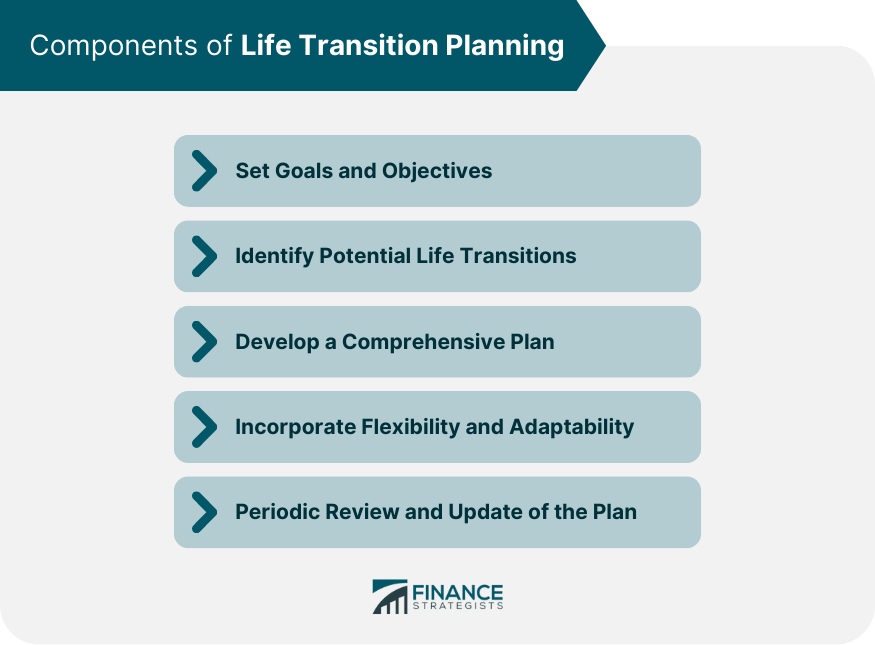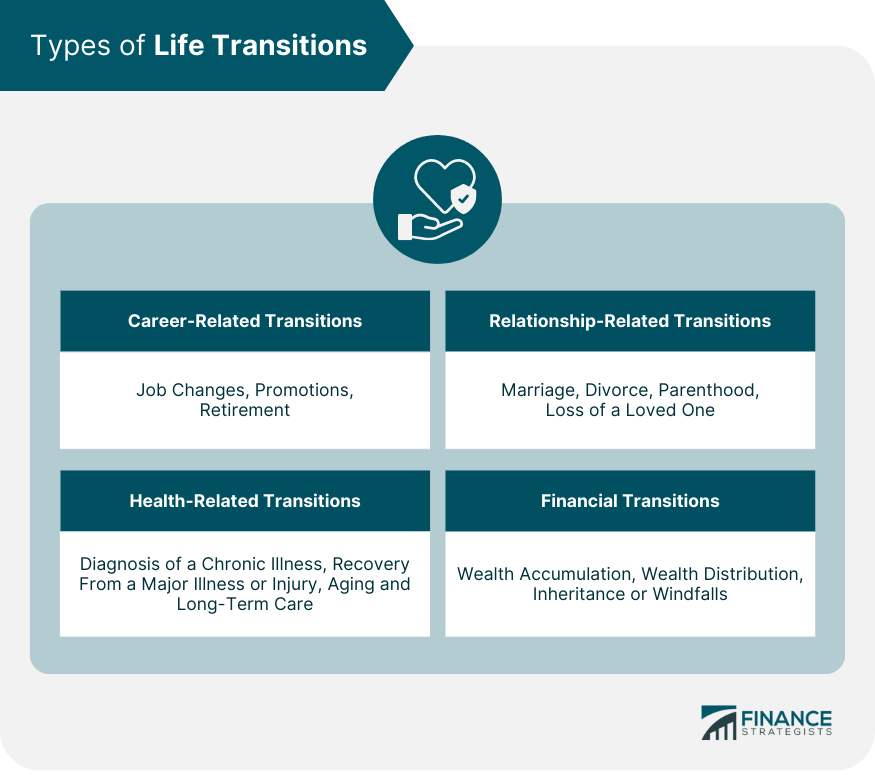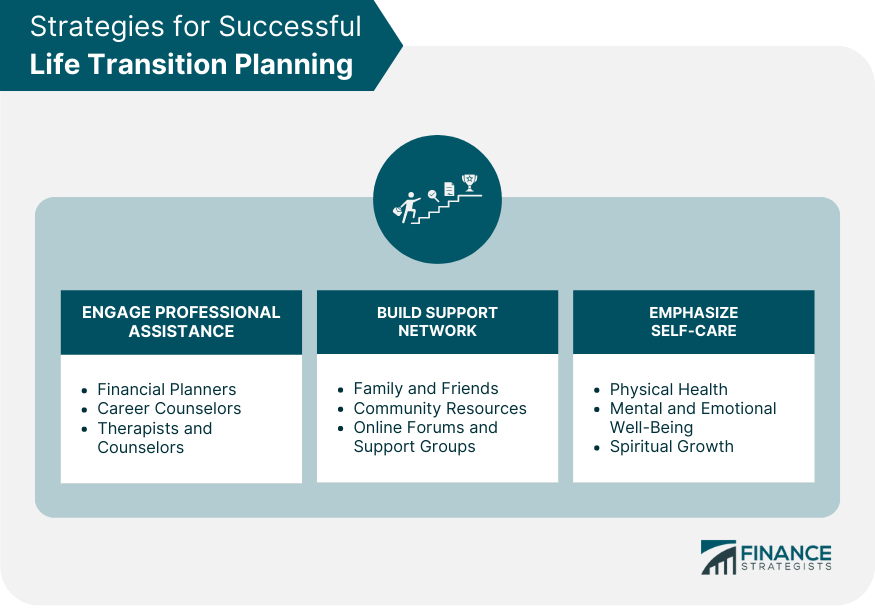Life transition planning is the process of preparing for significant changes in one's life, whether anticipated or unexpected. It involves identifying potential transitions, setting goals and objectives, developing a comprehensive plan, and maintaining flexibility to adapt to new circumstances. By preparing for transitions in advance, individuals can reduce the anxiety and uncertainty associated with change and make more informed decisions about their future. Life transitions come in many forms and can have profound effects on an individual's life. Some common life transitions include career changes, relationship milestones, health challenges, and financial shifts. These events can lead to both positive and negative outcomes, depending on how well an individual is prepared to handle them. The first step in life transition planning is to set clear goals and objectives for each potential transition. This involves determining what an individual wants to achieve during the transition and identifying the steps necessary to reach those goals. Goal-setting provides a sense of direction and purpose, helping individuals stay focused and motivated throughout the process. To create an effective life transition plan, individuals must identify the potential transitions they may encounter in their lives. This includes examining their current life stage, personal goals, and any upcoming events or milestones that could trigger a significant change. By recognizing potential transitions early on, individuals can better prepare for them and minimize the potential negative impacts. Once potential life transitions have been identified, the next step is to develop a comprehensive plan for navigating each transition. This plan should include specific action steps, resources, and support networks that will help individuals achieve their goals and manage the challenges associated with the transition. A well-developed plan can provide a roadmap for success and help individuals feel more confident and prepared. Life is unpredictable, and even the best-laid plans can be disrupted by unforeseen events. Therefore, it's essential to incorporate flexibility and adaptability into life transition planning. This involves being open to new ideas, reevaluating goals and plans as circumstances change, and seeking out additional resources and support when needed. Embracing flexibility and adaptability can help individuals navigate the ups and downs of life with greater ease and resilience. Life transition plans should be reviewed and updated periodically to ensure they remain relevant and aligned with an individual's goals and circumstances. This may involve revisiting goals, adjusting action steps, or identifying new resources and support networks. Regularly reviewing and updating a life transition plan can help individuals stay on track and maintain a sense of control during times of change. Job changes can be both exciting and challenging. They may involve moving to a new company, switching industries, or starting a new career altogether. To effectively navigate job changes, individuals should consider their long-term career goals, develop a plan for acquiring new skills and experiences, and build a professional network to support their transition. Promotions can bring increased responsibility, higher pay, and new opportunities for growth. However, they can also come with additional stress and the need to adapt to new roles and expectations. Preparing for promotions involves setting realistic expectations, developing leadership skills, and seeking out mentorship and guidance from experienced colleagues. Retirement is a significant life transition that involves leaving the workforce and adjusting to a new lifestyle. Planning for retirement should begin well in advance and include financial planning, identifying meaningful activities and hobbies, and building a support network of friends and family. By proactively planning for retirement, individuals can ensure a smooth transition and enjoy their golden years with peace of mind. Marriage is a major life milestone that signifies a commitment to sharing one's life with another person. To successfully navigate this transition, couples should engage in open communication, establish shared goals and values, and develop strategies for managing conflicts and challenges. Pre-marital counseling or workshops can also provide valuable guidance and support for couples preparing to embark on married life together. Divorce can be a challenging and emotional life transition. It involves the dissolution of a marital relationship and often requires individuals to adjust to new living arrangements, financial circumstances, and social dynamics. To cope with divorce, individuals should seek out professional help, such as therapy or legal advice, and build a support network of friends and family who can provide emotional support and guidance. Becoming a parent is a transformative experience that brings joy, responsibility, and new challenges. Prospective parents should prepare for this life transition by researching child development and parenting strategies, creating a support network of other parents and caregivers, and making necessary financial and logistical arrangements. Parenting classes and support groups can also provide valuable resources and insights for navigating the journey of parenthood. The loss of a loved one is a deeply emotional and challenging life transition. Grieving individuals may experience a range of emotions, from shock and disbelief to sadness and anger. To cope with this transition, individuals should allow themselves to grieve, seek out professional support, such as therapy or grief counseling, and lean on friends and family for emotional support. Receiving a diagnosis of a chronic illness can be a life-altering event that requires individuals to adapt to new medical treatments, lifestyle changes, and emotional challenges. To manage this transition, individuals should educate themselves about their condition, connect with support groups or healthcare professionals, and develop a plan for managing their health and well-being. Recovering from a major illness or injury can be a long and arduous process. It may involve rehabilitation, lifestyle modifications, and emotional healing. To navigate this transition, individuals should work closely with their healthcare team, set realistic goals for recovery, and seek out support from friends, family, and support groups. As individuals age, they may face new health challenges, reduced mobility, and the need for long-term care. Planning for these transitions should include exploring care options, discussing preferences with loved ones, and making necessary financial and legal arrangements. Engaging in regular physical activity, maintaining social connections, and practicing good self-care can also help promote healthy aging and independence. Wealth accumulation is the process of growing one's financial assets through saving, investing, and careful financial management. This can be a complex and challenging transition, particularly for individuals who are new to managing their finances. To successfully navigate this process, individuals should educate themselves about personal finance, work with a financial planner, and develop a clear plan for achieving their financial goals. Wealth distribution involves the process of passing one's financial assets to the next generation or donating them to charitable causes. This transition requires careful planning, including estate planning, tax strategies, and the establishment of trusts or other financial vehicles. Working with a financial planner or estate attorney can help individuals create a tailored wealth distribution plan that aligns with their goals, values, and legal requirements. By proactively addressing wealth distribution, individuals can ensure that their assets are distributed according to their wishes, potentially reduce tax liabilities, and provide a lasting financial legacy for their loved ones or chosen causes. Receiving an inheritance or windfall can bring a sudden influx of financial resources, which can be both exciting and overwhelming. To effectively manage this transition, individuals should develop a plan for allocating the newfound wealth, which may include paying off debt, investing, and charitable giving. It's also essential to consider the tax implications of such events and consult with a financial planner or tax professional to ensure compliance with relevant laws and regulations. Financial planners can provide valuable guidance and support throughout various life transitions, helping individuals develop strategies for managing their finances, planning for retirement, and navigating other financial challenges. By working with a financial planner, individuals can gain the knowledge and confidence needed to make informed decisions about their financial future. Career counselors can offer professional advice and resources for navigating career-related transitions, such as job changes, promotions, or entering new industries. They can help individuals assess their skills and interests, explore potential career paths, and develop plans for achieving their career goals. Therapists and counselors can provide emotional support and guidance during challenging life transitions, helping individuals cope with feelings of stress, anxiety, and grief. By seeking professional assistance, individuals can gain valuable insights and strategies for managing their mental and emotional well-being during times of change. Family and friends can offer invaluable emotional support and practical assistance during life transitions. By maintaining strong connections with loved ones, individuals can lean on their support network during challenging times and receive encouragement and guidance. Community resources, such as local support groups, nonprofit organizations, and educational programs, can provide additional assistance and resources for navigating life transitions. These resources can help individuals connect with others who are facing similar challenges and learn from their experiences. Online forums and support groups offer a virtual space for individuals to connect with others facing similar life transitions, share experiences, and seek advice. These platforms can provide a sense of camaraderie and support that can be invaluable during times of change. Maintaining good physical health is essential for successfully navigating life transitions. This includes regular exercise, a balanced diet, and adequate sleep. By prioritizing physical health, individuals can build the resilience and energy needed to face life's challenges. Caring for one's mental and emotional well-being is crucial during times of change. This may involve practicing mindfulness, engaging in hobbies and activities that bring joy, and seeking professional support when needed. Prioritizing mental health can help individuals maintain a sense of balance and well-being during life transitions. For many individuals, spiritual growth and exploration can provide a sense of purpose and meaning during life transitions. This may involve engaging in religious or spiritual practices, attending services or workshops, or seeking guidance from spiritual leaders. Nurturing one's spiritual life can help individuals find solace and strength during times of change. Life transition planning refers to the process of preparing for significant changes in one's life, whether anticipated or unexpected. It is essential for maintaining control over one's life, enhancing the ability to cope with change, and improving overall well-being. The components of life transition planning include setting goals and objectives, identifying potential life transitions, developing a comprehensive plan, incorporating flexibility and adaptability, and periodically reviewing and updating the plan. Life transitions include career changes, relationships, health challenges, and financial shifts, such as job promotions, divorce, illness, and inheritance. Successful life transition planning involves seeking professional assistance (financial planners, counselors), building a support network (family, community resources), and prioritizing self-care (physical health, mental well-being, spirituality). As part of a comprehensive life transition planning process, it is crucial to seek the guidance of a financial advisor. A financial advisor can provide valuable advice and resources for navigating various financial transitions, helping you to develop strategies for managing your finances, planning for retirement, and addressing other financial challenges.What Is Life Transition Planning?
Components of Life Transition Planning

Setting Goals and Objectives
Identifying Potential Life Transitions
Developing a Comprehensive Plan
Incorporating Flexibility and Adaptability
Periodic Review and Update of the Plan
Types of Life Transitions

Career-Related Transitions
Job Changes
Promotions
Retirement
Relationship-Related Transitions
Marriage
Divorce
Parenthood
Loss of a Loved One
Health-Related Transitions
Diagnosis of a Chronic Illness
Recovery From a Major Illness or Injury
Aging and Long-Term Care
Financial Transitions
Wealth Accumulation
Wealth Distribution
Inheritance or Windfalls
Strategies for Successful Life Transition Planning

Engaging Professional Assistance
Financial Planners
Career Counselors
Therapists and Counselors
Building a Support Network
Family and Friends
Community Resources
Online Forums and Support Groups
Emphasizing Self-Care
Physical Health
Mental and Emotional Well-Being
Spiritual Growth
Final Thoughts
Life Transition Planning FAQs
Life transition planning is the process of preparing for significant changes in one's life, such as career shifts, relationship changes, health challenges, or financial transitions. It is important because it helps individuals maintain control over their lives, enhance their ability to cope with change and improve overall well-being.
The key components of life transition planning include setting goals and objectives, identifying potential life transitions, developing a comprehensive plan, incorporating flexibility and adaptability, and periodically reviewing and updating the plan.
Professional assistance, such as financial planners, career counselors, therapists, and counselors, can provide valuable guidance and support throughout various life transitions. These professionals can help individuals develop strategies for managing their finances, careers, and emotional well-being, ensuring a smoother and more successful transition.
Some strategies for successful life transition planning include engaging professional assistance, building a support network of family, friends, and community resources, emphasizing self-care through physical health, mental and emotional well-being, and spiritual growth, and maintaining flexibility and adaptability.
To get started with life transition planning, begin by identifying your goals and objectives for various areas of your life, such as career, relationships, health, and finances. Next, consider potential life transitions that you may face and develop a comprehensive plan for navigating these changes. You may also want to seek professional assistance, such as a financial advisor, career counselor, or therapist, to help you navigate specific transitions and ensure a more successful outcome.
True Tamplin is a published author, public speaker, CEO of UpDigital, and founder of Finance Strategists.
True is a Certified Educator in Personal Finance (CEPF®), author of The Handy Financial Ratios Guide, a member of the Society for Advancing Business Editing and Writing, contributes to his financial education site, Finance Strategists, and has spoken to various financial communities such as the CFA Institute, as well as university students like his Alma mater, Biola University, where he received a bachelor of science in business and data analytics.
To learn more about True, visit his personal website or view his author profiles on Amazon, Nasdaq and Forbes.















